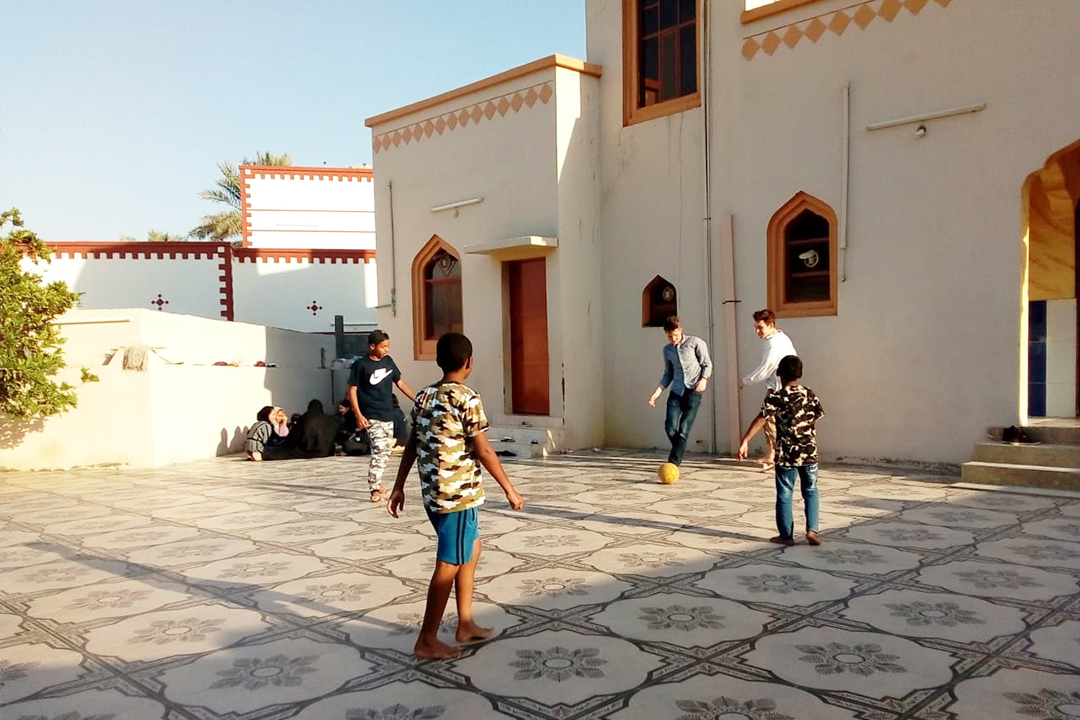For the students in Associate Professor of Arabic and International Affairs Mohssen Esseesy’s Business Arabic class, a 2019 spring break trip to Oman offered a one-of-a-kind opportunity. Sophomore Arabic student Sanjna Kulkarni expected the study abroad program to let her explore business-in-action within an emerging Middle Eastern economy while perfecting her Arabic-speaking skills. But she didn’t expect it to be a turning point in her life.
Kulkarni credits her experiences with helping her earn a summer internship at the Sultan Qaboos Cultural Center, a branch of the Sultanate of Oman Embassy in the U.S. In addition to boosting her career prospects, her week in Oman left Kulkarni and her seven fellow undergraduate travelers with “endless amounts of memorable moments,” she said. Kulkarni prayed at the Sultan Qaboos Grand Mosque, gave a surprise piano recital at the Royal Opera House in Muscat and shopped for henna and honey in the Omani street markets—or souqs—beside students from Sultan Qaboos University who have already become fast friends.
“Having the opportunity to immerse myself in such a unique culture and country like … Oman was a blessing in so many ways,” she said.
That’s the kind of cultural and educational reaction Esseesy was hoping for when he spent a year preparing his one-credit, short-term study abroad course Oman Business & Culture.
With the help of a grant from the George Washington University Center for International Business Education and Research (GW-CIBER), Esseesy teamed with partners in Oman, including educators from the nonprofit Inspire Oman, to devise a program that was a combination of business blueprints and cultural exploration. During the trip, students met with leaders from Omani industries including oil and energy, banking, tourism and development, while also touring cultural sites like Oman’s National Museum and the historic 17th century Nizwa Fort. “I hope this trip opened their eyes to a wider world,” Esseesy said. “They encountered a culture that is very different from theirs. Linguistically, their competence in Arabic improved as they conversed with native speakers in professional settings well beyond the classroom.”
For former Arabic minor Ian Hourican, BA ’19, the trip offered a window into Middle Eastern industries that helped propel his interest in international business. “I was studying oil and gas issues in the region so it was great to hear from individuals who work in that field,” he said, noting that the students met with executives from Occidental Petroleum in Muscat. “The trip was good practice for my Arabic and a great experience for business and economics.” Now a consultant at the Center for Advanced Defense Studies, Hourican credits the trip as a highlight on his résumé.
The students also visited the U.S. embassy in Muscat and met with then-Ambassador Marc J. Sievers. They were greeted by Political Officer Kabeeer Parwani, BA ’11, and treated to a tour from Vice Consul Sarah Jasmine Knight, MA ’14, BA ’11, a former student from Esseesy’s Business Arabic class. “I think the students loved meeting someone who actually achieved their dreams,” Esseesy said of Knight, who received her master’s in Middle Eastern studies after minoring in Arabic as an undergraduate. “She’s in the best place to follow her interests in international affairs and, at the same time, utilize her Arabic.”
During their week long study abroad trip to Oman, students visited the Sultan Qaboos Grand Mosque in Muscat.
For Kulkarni, the program was a cultural and linguistic revelation. A first-year Arabic student at the time, her language skills were raw, she said. But immersed in Omani culture, she soon found herself communicating with fellow students and local merchants. At a Rozna restaurant in Muscat, she talked to waiter about the spices in the vegetable curry. One of her assignments was to lead a scavenger hunt through a souq market. Paired with an Omani university student, she spoke with shopkeepers about crafts, food and Halwa, traditional Omani sweets. “I formed friendships [with Omani students] that are still strong today and I learned about Omani lifestyle and culture in an informal manner,” she said. On a visit to an Omani home, the students chatted with a family over dates and coffee, and even challenged several Omani teenagers to a game of soccer. ”The GW team was resoundingly defeat,” Esseesy laughed.
During a visit to Muscat’s Royal Opera House, Esseesy mentioned to a tour guide that Kulkarni, a music minor, was a classically trained pianist. The guide suggested Kulkarni perform an impromptu recital at the venue’s concert hall. “It was a spontaneous moment in my life as an artist that was made all the more special because I was able to share it with my class and professor. They showered me with so much appreciation and love after listening to me play,” Kulkarni said.
Esseesy, who hopes to resume the program in future semesters, says the students thrived in an immersive-learning experience that took them out of the comfort zone of the classroom and into the middle of an unfamiliar society. “Experiential learning can help students not only gain deep knowledge but also internalize and personalize it,” he said. “Even though the students all passed through the same experience, each one of them had a unique take on their time in Oman.”



